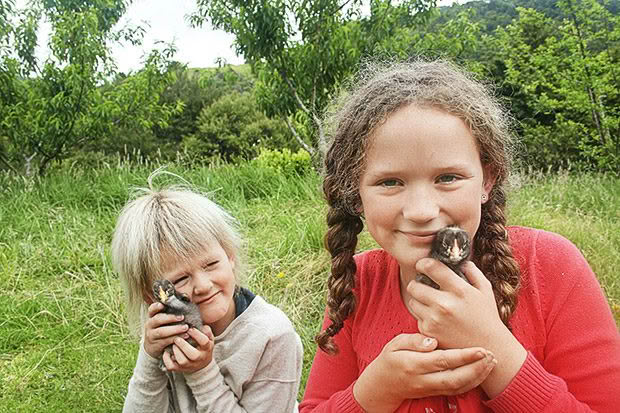Polly Greeks’ Blog: The new chooks on the block
Polly’s brood gets clucky over new chooks.
We need to discuss birds and bees — not in a reproductive sense; but gainfully, in terms of eggs and honey. “I’ve ordered two hives,” I began as a sweetener. We’d been planning to do this for years. “And we’re getting a new flock of hens.”
A pained expression crossed James’ face. Our last chooks belonged to a breed called Marital Disharmony. Sinewy, eggless and conniving in their defecations, they wreaked havoc around gardens and citrus trees when I declared them free-ranging. Even though James had eventually eaten them, the revenge had been tough and stringy instead of sweet.
I promised to keep the new birds contained. “And they’re dual-purpose.”

Polly’s children, Zendo and Vita, with the barred plymouth rock chicks.
An old chicken breeder near Kaitaia had been raising heirloom breeds for 80 years. On hearing my request for placid, prolific layers into which an omnivorous husband could sink his teeth, he advised that a dozen barred plymouth rock eggs were entering an incubator for our family.
“A dozen.” James squinted hard, trying to catch my vision of a pretty, striped flock scratching among the foxgloves. His enthusiasm perked detectably at descriptions of plump young roosters marching towards the roasting dish.
“So, we’ll only eat the boys?” Nine-year-old Vita seemed to think that was acceptable. “We’ll name them Dinner and Stew and that sort of thing so we don’t get attached,” I declared.
The chicks were two days old when we brought them home with instructions to keep them indoors. Cute as pie, none was given a culinary name. They made an extraordinary amount of noise. Even so, I scolded six-year-old Zendo, that was no excuse to hold their beaks shut. “But they cry so much,” he complained.
Soon it became apparent the chicks were in as much danger from his kindness as his cruelty. “Mu-um. Zen’s holding a chick upside down and shaking it,” his sister broadcast.
Earnestly, Zen explained how one had drunk too much water. “I was just trying to get some out.”
We stopped him washing chicks, rescued chicks from premature “flying lessons” and pulled ruffled baby chicks from his pockets.
But life itself delivered the cruellest action. First, Patchy fell in the water dish. Although it was too shallow to drown in, the tiny bird never recovered from its wetting. The other chicks, sensing its vulnerability, pecked it. When it fell again, they trampled it. Perhaps this was nature’s way of eliminating a dud, but it was too pitiful to just leave in a broken pile. Wet, crumbed in chick food and feebly peeping, it curled in my hand as I looked for somewhere warm to put it.
Bras seem custom-made for fledgelings in crises. Tucked in satin and lace, on a pillow of softly warmed flesh, Patchy rode the morning in the bosom of luxury. When we had to go out, she was transferred to a hot water bottle. Returning, we found her laid stiff, rigid claws extended with her unblinking eyes focused on the great coop in the sky.
Heartbroken, Vita wrote a tear-stained obituary five times the length of the bird while Zendo prepared for the burial. Only, then, Patchy squeaked from her shroud. She took four days to die, fading on droppers of a fortifying solution while Vita wrote instructive letters to her soul, “only to be read by her when she’s dead”.
Proving one door opens as another shuts, the chicken breeder announced on the day of Patchy’s funeral that he had six more baby barred rocks seeking a home. We left his farm with more than we had intended. Vita had gained a snowy andalusian chick as a gift; Zendo was the proud carer of a lame bird he named Bunson Hopper while James and I both carried gleams in our eyes.
“I think we’ll order some minorca hens next,” I ventured experimentally on the journey home.
Who knew chook breeds could be so addictive? To my surprise, James nodded easily. Inspired by the old farmer’s bountiful soil, he’d caught a different kind of chicken lust, hungering for all the poo he could muster.

